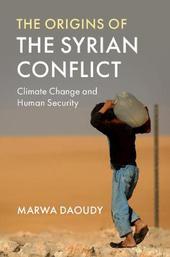
|
The Origins of the Syrian Conflict: Climate Change and Human Security
Paperback / softback
Main Details
| Title |
The Origins of the Syrian Conflict: Climate Change and Human Security
|
| Authors and Contributors |
By (author) Marwa Daoudy
|
| Physical Properties |
| Format:Paperback / softback | | Pages:267 | | Dimensions(mm): Height 227,Width 152 |
|
| Category/Genre | Social impact of environmental issues |
|---|
| ISBN/Barcode |
9781108466820
|
| Classifications | Dewey:956.910423 |
|---|
| Audience | | Tertiary Education (US: College) | | Professional & Vocational | |
|---|
| Illustrations |
Worked examples or Exercises; 14 Tables, black and white; 27 Line drawings, black and white; Worked examples or Exercises; 14 Tables, black and white; 27 Line drawings, black and white
|
|
Publishing Details |
| Publisher |
Cambridge University Press
|
| Imprint |
Cambridge University Press
|
| Publication Date |
26 March 2020 |
| Publication Country |
United Kingdom
|
Description
Does climate change cause conflict? Did it cause the Syrian uprising? Some policymakers and academics have made this claim, but is it true? This study presents a new conceptual framework to evaluate this claim. Contributing to scholarship in the fields of critical security, environmental security, human security, and Arab politics, Marwa Daoudy prioritizes non-Western and marginalized perspectives to make sense of Syria's place in this international debate. Designing an innovative multidisciplinary framework and applying it to the Syrian case, Daoudy uses extensive field research and her own personal background as a Syrian scholar to present primary interviews with Syrian government officials and citizens, as well as the research of domestic Syrian experts, to provide a unique insight into Syria's environmental, economic and social vulnerabilities leading up to the 2011 uprising.
Author Biography
Marwa Daoudy is Assistant Professor in the Center for Contemporary Arab Studies at Georgetown University, Washington DC. The co-organizer of a major climate change conference at Princeton University, she has been a policy advisor and consultant for government agencies including the UNESCO-World Water Assessment Program, and contributed to the establishment of the Oxford Water Network, a research-led project which focuses on improving water security across the globe. She is the author of The Water Divide between Syria, Turkey and Iraq: Negotiation, Security and Power Asymmetry (2005), which was awarded the Ernest Lemonon prize by the Academie Francaise.
Reviews'This excellent book seriously engages with the climate-conflict thesis that drought and climate change propelled the Syrian uprising. The lesson here that environmental ideology matters is important for Syria and the wider Global South. It should be read by anyone interested in understanding Syria's pre-conflict political landscape, especially those who remain convinced that climate change alone produced the conflict.' Samer Abboud, Villanova University 'Marwa Daoudy's book provides a much needed qualitative analysis of the complex relationship between climatic changes and political violence. By moving beyond simplistic claims that climate change causes civil wars her book adds a lot to our understanding of how climatic conditions relate to the causes and consequences of the conflict in Syria.' Thomas Bernauer, ETH Zurich 'Was the Syrian conflict caused by climate induced drought? This important book offers an insightful and comprehensive answer to this timely question. Drawing on original interviews, fieldwork, publicly available and classified documents she refutes the popular view that climate change was the main causal driver of this conflict and instead shines a light on elite driven unsustainable water and agricultural policies. An impressive book and a must read for anyone who wants to understand the complex nexus between climate change and security.' Rita Floyd, University of Birmingham 'This is an erudite, paradigmatic study of the origins of the ongoing Syrian civil war that commenced in March 2011 ... Every policy maker in the US government should read this book.' R. W. Olson, Choice
|